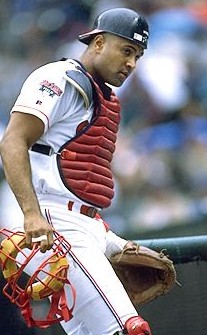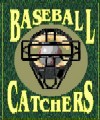| |
The catcher
must be the team's leader. He has the entire field in front of him and
is able to read and react to every situation. While the ball is in play,
he is the only player that never has his back turned towards the field of action. He, in essence, is the general directing his troops.
|

Field General Sandy Alomar Jr. |
Everything must go through the catcher. He is responsible for
calling pitches, keeping up the pace of the game, reacting to all situations,
and also being an on-field psychologist. He must be able to get everything
out of his pitchers and his teammates.
You’ve heard the old cliché that a championship team must
be strong up the middle. That begins with the catcher. A team's destiny
can lie in the hands of it's catcher. If a team is short on talent, experience,
and desire behind the plate, then it's championship hopes have diminished.
Conversely, if a team has a fierce competitor that will be able to inspire
the team and motivate them to new heights, then the possibility of greatness
will exist.
As a leader, the catcher must give orders. But, no one will take orders from someone who doesn't know what they are doing. |
A catcher must be able to anticipate all situations, from bunt defense
to outfield relays, and ensure that his team is in control. The catcher must take into account the speed of
the runner, the playing conditions, the type of athletes involved, the
game situations, the playing surface, and other important aspects. A catcher
must have gone through these things at practice over and over so that he does not have to think
about them in game situations. He must be able to react and respond immediately.
That takes training.
During practice a catcher begins his field leadership. That means no fooling around and constant learning. A catcher has to learn from the coaches what should be done in every situation and why. The catcher should assist the coaches in directing drills without being a self-appointed boss. Being a field leader means that others will automatically look to you to find out what should be done. That means that the catcher must know the correct answer.
The catcher has to be the toughest guy in the yard. No practice is too long. No drill too hard. No sun too hot and no foe too strong. He must take
command and demand respect and performance from his pitching staff and
other position players. When a crucial situation arises, the catcher must
step-up and take charge of the game. His role is team leader, won by hard work and not by edict.
|


